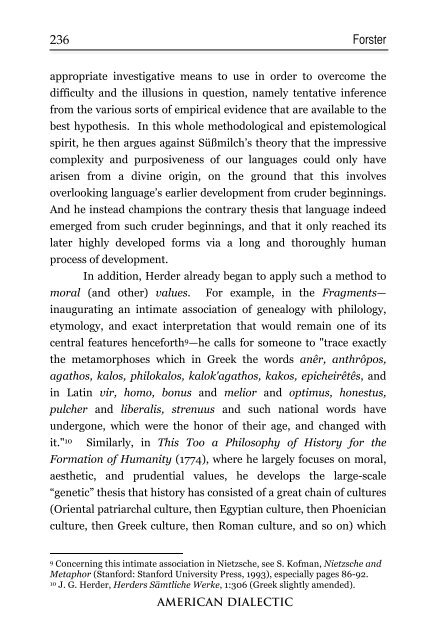Genealogy Michael Forster - American Dialectic
Genealogy Michael Forster - American Dialectic
Genealogy Michael Forster - American Dialectic
You also want an ePaper? Increase the reach of your titles
YUMPU automatically turns print PDFs into web optimized ePapers that Google loves.
236<br />
AMERICAN DIALECTIC<br />
<strong>Forster</strong><br />
appropriate investigative means to use in order to overcome the<br />
difficulty and the illusions in question, namely tentative inference<br />
from the various sorts of empirical evidence that are available to the<br />
best hypothesis. In this whole methodological and epistemological<br />
spirit, he then argues against Süßmilch’s theory that the impressive<br />
complexity and purposiveness of our languages could only have<br />
arisen from a divine origin, on the ground that this involves<br />
overlooking language’s earlier development from cruder beginnings.<br />
And he instead champions the contrary thesis that language indeed<br />
emerged from such cruder beginnings, and that it only reached its<br />
later highly developed forms via a long and thoroughly human<br />
process of development.<br />
In addition, Herder already began to apply such a method to<br />
moral (and other) values. For example, in the Fragments—<br />
inaugurating an intimate association of genealogy with philology,<br />
etymology, and exact interpretation that would remain one of its<br />
central features henceforth 9 —he calls for someone to "trace exactly<br />
the metamorphoses which in Greek the words anêr, anthrôpos,<br />
agathos, kalos, philokalos, kalok'agathos, kakos, epicheirêtês, and<br />
in Latin vir, homo, bonus and melior and optimus, honestus,<br />
pulcher and liberalis, strenuus and such national words have<br />
undergone, which were the honor of their age, and changed with<br />
it." 10 Similarly, in This Too a Philosophy of History for the<br />
Formation of Humanity (1774), where he largely focuses on moral,<br />
aesthetic, and prudential values, he develops the large-scale<br />
“genetic” thesis that history has consisted of a great chain of cultures<br />
(Oriental patriarchal culture, then Egyptian culture, then Phoenician<br />
culture, then Greek culture, then Roman culture, and so on) which<br />
9 Concerning this intimate association in Nietzsche, see S. Kofman, Nietzsche and<br />
Metaphor (Stanford: Stanford University Press, 1993), especially pages 86-92.<br />
10 J. G. Herder, Herders Sämtliche Werke, 1:306 (Greek slightly amended).


